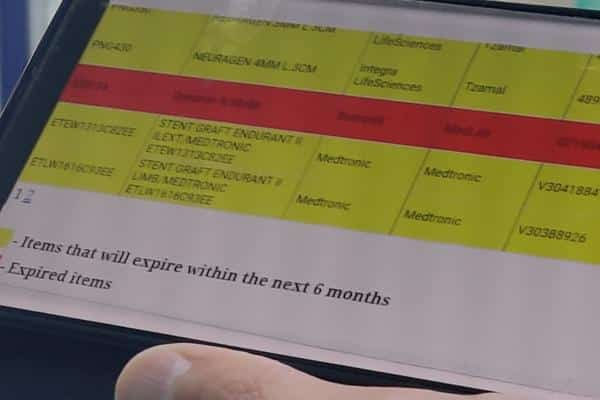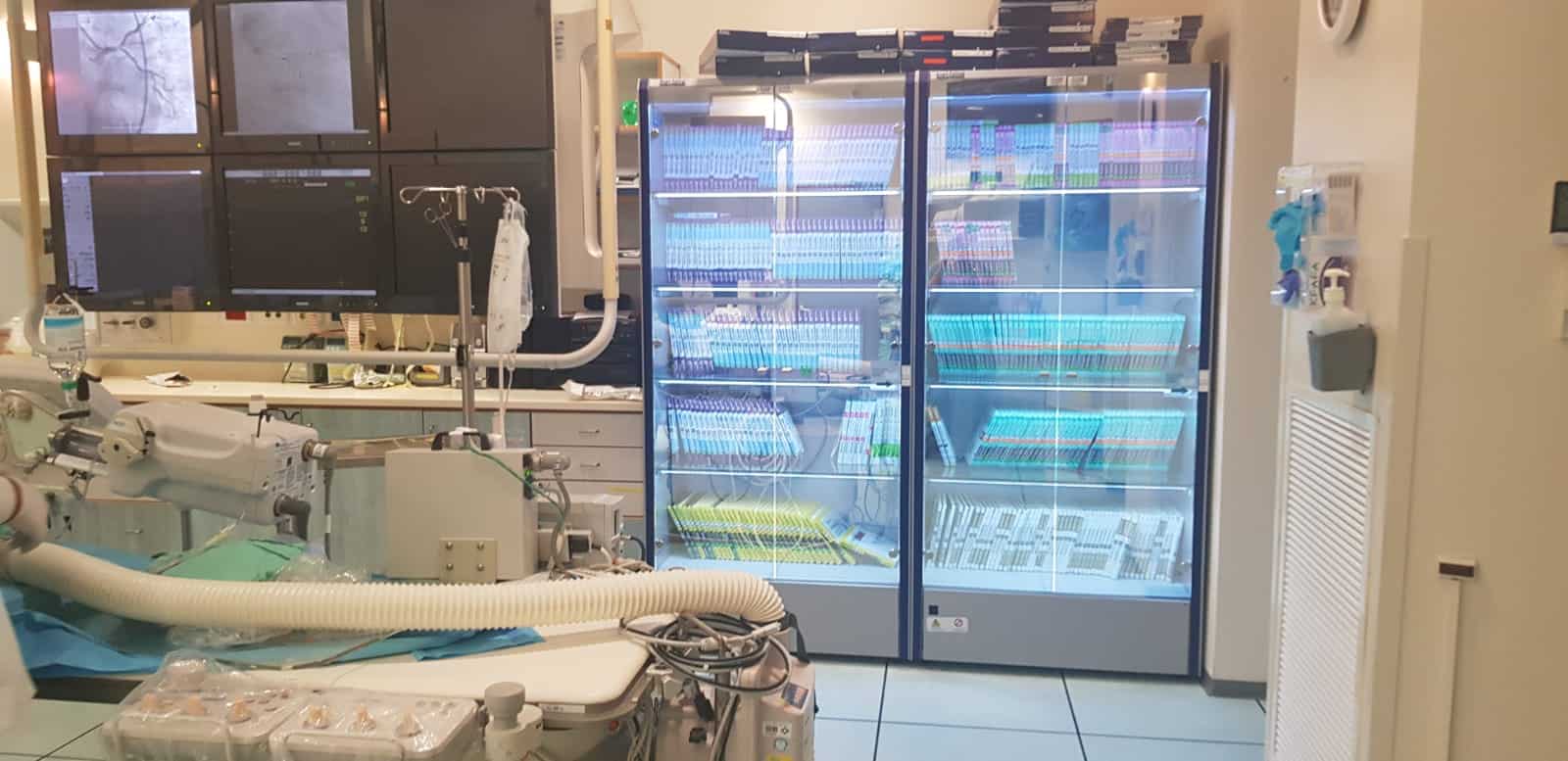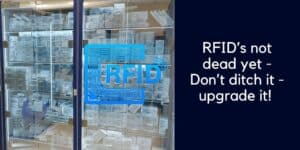What’s inside:
In the surgical suite, efficient management of medical devices, tissue and implants is crucial. This blog looks at:
- The limitations of older implant tracking systems in healthcare
- How advanced technology is reshaping the implant management landscape.
- A new generation of smart cabinet that is enhancing clinical and operational efficiency.
Technology is proving to be a driving force in tackling healthcare inefficiencies and improving hospital margins. Yet some healthcare providers still rely on inefficient manual logs or excel spreadsheets to manage one of their biggest areas of expense – medical devices and implants. Manual systems make implant tracking a time-consuming and error-prone task for nurses. Even when automation is in place, limitations in functionality and usability can make them unreliable.
Benefits of an automated smart cabinet
Automated inventory management in healthcare is becoming common place. Smart cabinets are used to monitor and manage high value inventory – providing data on product availability, as well as items removed for use.
When healthcare organizations gain item-level visibility of their inventory, they can work smarter; locating items in minutes and using data to underpin decision-making that can reduce costs and improve efficiency.
The right smart cabinet can actually deliver benefits for patients, clinicians, materials management, and leadership, as well as for external supply chain partners.
So, let’s take a look at some of the ways that a top-quality smart cabinet can improve the management of tissue and implant tracking.
Minimizing wastage due to expiry:
Medical devices and implants are a major line of expenditure for healthcare providers, yet despite this, system inefficiencies often fail to prevent high levels of wastage. A major cause of implant wastage is when items expire on the shelves, in fact, what actually happens is that all the remaining items in a batch will expire at the same time – so multiple items are wasted in one go.
Smart cabinets can tackle this issue head-on as they store key item data, including the expiration date. Stock reports will routinely list the expiry date and highlight items that are:
- Nearing expiry and need to be prioritized for usage, or
- Already expired and need to be removed.
This proactive approach to expiry management relies upon the full capture of item data, usually via RFID-enabled implant storage, in conjunction with inventory reports that are generated by the managing system. This combination of hardware and software puts an end to time consuming and inefficient manual inventory monitoring.

Automation helps healthcare organizations to use data to address high costs and high wastage.
Proactive expiry management actually prevents wastage in four ways:
| Area of waste prevention | Details |
| Item usage prior to expiry: | Products nearing expiry are identified and prioritized for usage, preventing the wastage of items. |
| Avoiding litigation costs: | Expired items are removed from the shelves, preventing accidental consumption which could cause a ‘never event’ – and significant wasted expenditure on litigation costs. |
| Less procurement | When stock is effectively rotated and wastage is prevented, the level of procurement is reduced. Additional stock is not required to replace wasted products, saving unnecessary expenditure. |
| Reduced Labor | Automation stops staff wasting time rooting through cabinets and shelves to check the expiry date of every item. Lower levels of procurement also lead to reduced labor costs. |
Automated implant management via a high-quality RFID smart cabinet provides management information that can drive through improved efficiencies and cost savings.
Stock monitoring and control:
Every surgical space is reliant on the right medical supplies being available, in the right place, at the right time. Keeping the surgery schedule on track is a high priority task that supports timely care and better patient outcomes. This can only happen when an organization has a strong inventory management system in place.
Smart cabinets offer hospitals and ambulatory surgery centers enhanced implant management by constantly monitoring the stock at hand and reporting on items removed.
The right smart cabinet will optimize stock levels by automating replenishment. A good system can generate automated item requisitions when a pre-defined point is reached for a product.
Accurate stock vision and automated restocks ensure that optimum stock levels are maintained, and continuous product availability puts an end to stock-outs and expensive last-minute orders.
When medical devices, tissue and implants are managed using full and accurate data there are significant cost-savings to be made.
Labor Efficiency:
The right smart cabinet can significantly reduce the time and effort invested by nurses and logistics staff in the management of medical devices and implants.
- Ease of location: Nurses will know where to find every medical device or implant without all that hunting around. Nurse feedback suggests that the right smart cabinet can save 75% of the working day!!
- Stock monitoring: There’s no need to monitor stock for expiry or recall – automation handles all of that.
- Patient safety: When implant management automation saves nurses time it frees them up to focus on patient care.

Avoiding litigation and non-compliance:
Implant-related litigation can have severe financial and reputational implications for healthcare providers.
Organizations can mitigate this risk by using a smart cabinet that digitally tracks implants and ensures compliance with the FDA UDI regulations.
When an automated implant management system is in place, crucial stock information is stored, including lot numbers, serial numbers, and expiration dates. This digital implant record supports the improved management of current and future events, for example:
- Pre consumption protection: Accidental misuse or an expired or recalled item can be prevented by a built-in safety alert feature.
- Post surgery safeguards: If a patient has an adverse reaction to an implant, or if there is a product recall that needs to be managed – then accessing patient/implant data stored in the system will facilitate a swift response. In the event of any litigation a strong implant recall process and robust data will strengthen an organization’s legal defense.
It’s clear that smart cabinets can be of real benefit to healthcare providers looking to improve their management of medical devices and implants. But what do providers need to look out for when selecting a smart cabinet? Our handy checklist covers the must-have features your new smart cabinet needs.
7 must-have smart cabinet features
Smart cabinets can look similar, but be warned, there can be big differences in the technical capabilities of both the hardware and software. When looking for a new smart cabinet there are key features to look out for. So, lets’ review these now:
RFID inventory systems:
Not all cabinets are as smart as you may think, some will only capture the data of items stored in a set position. In real life staff may not place or return an item in the specific position required by the system, and this will limit the accuracy of the data collected. The number and position of RFID sensors is important and cabinets with more advanced UHF RFID sensing capabilities will be able to read items however they are placed on the shelves. The basic requirement for any smart cabinet is that it provides full inventory visibility – however the items are stored.
Clinician-friendly:
Staff should be able to add or remove items without having to key in data or scan products. The cabinet should have the capability to track its own stock without human intervention. The right system will have an intuitive interface and require minimal training.
In addition, it will generate easy-to-read inventory reports that guide staff towards the items they need – eliminating all the ‘inventory hunting’ that so often exhausts nurses. Systems need to be simple to use and produce clear, user-friendly metrics, reports and analytics that improve the management of items stored in the cabinet.
Optimum tracking:
Many systems state they have item-level traceability but not all present the full picture:
- Which item was removed?
- Which staff member removed the item?
- Which procedure was the item used for?
The ability to carry out batch tracking is also important to handle expiry and implant recall management.
End-to-end digital tracking ensures comprehensive item tracking that provides the full picture and ensures FDA compliance for UDI medical device and implant regulations.
Metrics, Reports, Insights:
Modern smart cabinets are often powered by cloud-based inventory management systems, and these ensure that automated smart cabinets compile and share valuable data. The best systems will produce user-friendly management information that is easy to read and supports better decision making. Inventory data can be analyzed to provide in-depth insights such as usage patterns, safety alert reports and requisition requirements – both now and anticipated. When looking for a new smart cabinet be sure to check out the system’s reporting capabilities and also take a look at sample reports.
3rd party visibility:
In recent years there has been a growing trend for closer collaboration between supply chain partners. This includes sharing real-time inventory tracking data across key supply chain stakeholders. When there is trust and transparency between partners it opens up the opportunity for enhanced purchasing arrangements. Automated cabinets can be used as a consignment solution where stock is managed by the vendor virtually but is available on-site for the healthcare provider.
Interoperability:
However great a system is, if it doesn’t integrate with hospital information systems then it has limited value. A good smart cabinet will have managing software that facilitates the smooth exchange of data. This integration enables real-time system updates so that vital supply chain data can be shared with other internal or external stakeholders.
Scalability:
Some organizations make the mistake of buying a system that meets their current needs without considering future expansion. It’s best to look for a solution that can accommodate growth – both in terms of scaling the number of cabinets being managed and looking at the potential for the same managing software to manage other inventory management solutions, such as automated Kanban and PAR or point of use data-capture systems. Having a single cloud solution keeps things nice and simple.

TotalSense Smart Cabinet from IDENTI
TotalSense offers advanced hardware plus cutting-edge software – creating a transformative solution for automating implant management in operating and procedural rooms.
By leveraging advanced RFID, AI and machine learning technology, TotalSense ticks all the ‘must-have’ features on our checklist and drives through implant management efficiencies.
One customer reduced the cost o their excess inventory by $2-3million – read more in the smart cabinet case study.
TotalSense comes in a variety of configurations to suit all types of stock and is a proven success in Cath Labs, Interventional Radiology, Ophthalmology, Orthopedisc, Gastro labs, Plastic Surgery, OR and procedure rooms, and more.
Find out how much your organization could save by installing Total Sense.
Contact us if you want to add speed and efficiency to the management of your implants and medical devices.






